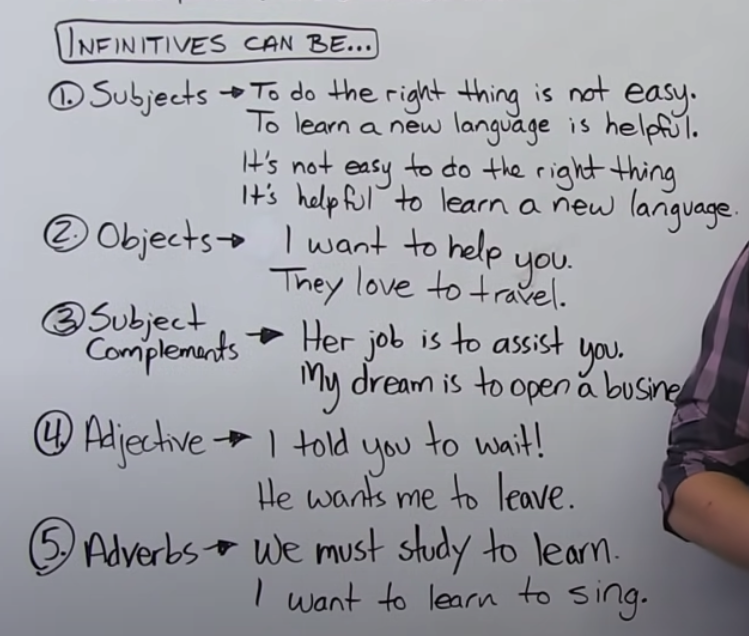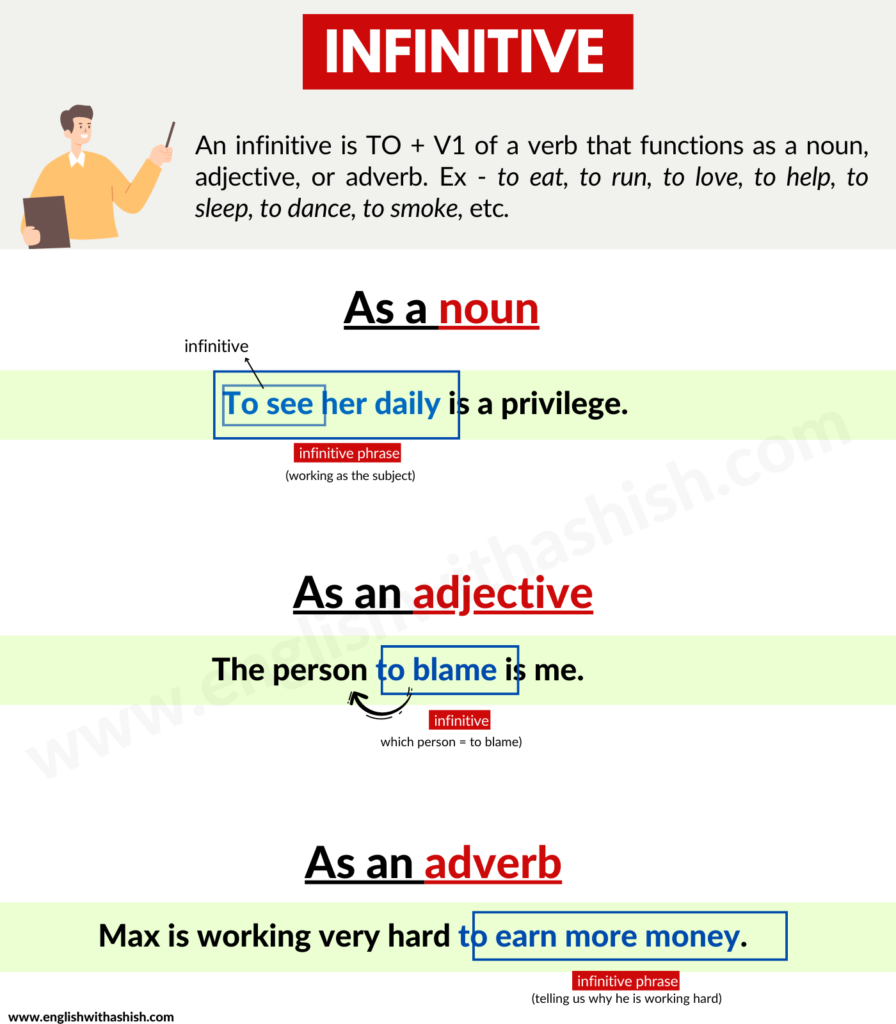ref –
- https://www.youtube.com/watch?v=8ZTikQEt0Z8
- https://www.grammarly.com/blog/infinitives
- https://www.youtube.com/watch?v=NK4CT8eovf0
- https://learnenglish.britishcouncil.org/grammar/english-grammar-reference/infinitives
- https://www.grammarly.com/blog/to-vs-for/
- https://englishsentences.com/infinitive/
What is an infinitive, and what is its function?
Purpose of Infinitive
The purpose of infinitives is to discuss an action in general instead of a specific instance of the action being done.
For example, take a look at these two sentences:
note:
I need (verb) food (noun)
I need (verb) [to win](noun)
I need [something] √ (used as a noun)
The first sentence uses the infinitive form of the verb win as a noun
the main verb of the sentence is actually “need.”
An infinitive consists of the word to plus a verb. In other words, any verb that is preceded by the word ‘to’ is an infinitive. Here are some examples:
- to love
- to eat
- to run
- to believe
- to follow
- to laugh
- to stare
- to wonder
ex: She loves to wear really colourful dresses.
I need to leave early today.
An infinitive is a basic form of a verb that acts as a:
-
Object
Subj + stative feelings/thought verb + [to verb]
stative feeling verb – hate, like, love, want, hope, prefer, wish, hope, desire, need…
stative thought verb – agree, remember, forgetExample:
I want (verb) [to jump].
We cannot say ‘I want jump’ because that is ‘subj verb verb’.
We put a to in front of jump to make it into a noun.
“to jump” is the infinitive as it receives the action of the verb ‘want’.Therefore,
I (subj) want (verb) [to jump (verb) ] noun
Example:
I like to study.
Here “like” is the verb.
“To study” is the infinitive as it receives the action of the verb (to be liked).
“To study” acts as a direct object of the sentence.
I need to eat.
In this sentence, the verb is “need.”
Who or what do I need? The infinitive “to eat.”
“To eat” is the direct object of “need” because it receives the action.
This is an example of an infinitive being used as a noun.
I love to sleep.
In this sentence, the verb is “love.”
Who or what receives the action of being loved? The infinitive “to sleep.”
This makes “to sleep” the direct object of the sentence.
In this case, the infinitive functions as a noun that expresses an opinion. It could be replaced with a person, place, or thing, as in, “I love pizza.”
-
as Adjective
– Infinitives that acts as an adjective comes after a noun.
Subj + [is/are/has/have] + object + [infinitive as adjective]
We perform the function of an adjective by modifying or describing the name of person, animal, object, or place (nouns or noun phrases).
Remember that an adjective is a word that describes or modifies a noun or pronoun.
Example:
That is the (question) [to answer].
What are we trying ‘to answer’? The question!
Thus, [to answer] act as an adjective for the noun question.I have a job (noun) [to do] (adj).
‘to do’ is the infinitive that acts as an adjective. What are we trying to do?
The job! Thus [to do] acts as an adjective the noun job.He has the (most) [to gain].
‘to gain’ is an adjective that describes the noun ‘most’. Most to what? Most to lose? Most to gain? Most to sacrifice? We don’t know. We need a to-verb to describe ‘He has the most’ to what, so that readers can understand.
I have (somewhere) [to be].
‘to be’ is an adjective that describes the noun ‘somewhere’.
The (book) [to read] is a mystery.
What are we trying to read? The book!
Thus, [to read] acts as an adjective for the subject noun book.
They are (creatures) [to fear].
What are we to fear? The creatures!
Thus, [to fear] acts as an adjective for the subject creatures.He is to blame.
Who is to blame? He!
So we use [to blame] as an adjective for subject pronoun ‘He’. -
as Adverb
– Adverbs describe verbs, adjectives, or other adverbs. Adverb infinitives tell the reader why the action is necessary. They act as adverbs to describe the main verb.
Subj + action verb + ‘in order’ + [to + verb]
Example:
She (ran, verb) [to catch] the bus.
We want to answer why she wanted to run. To catch the bus.
Mom left (main verb) [to buy] milk. (We want to describe the verb…so we want to answer why did mom leave? To buy milk)
Example:
I’m writing (verb) this email [to tell] you something important.
(Why are you writing? To tell you something important)We’re trying to describe the main verb write.
Example:
Did you come (verb) to college [to study] or [to party]? (Why did you come? To either study or to party)
However, Adjective infinitive and Adverb infinitives are awfully hard to distinguish. How do we tell it apart?
Use the ‘in order’ to test.
As the Object of a Sentence
I (subject) want (action/verb) [to be] an astronaut
[to be] answers ‘want’, acts as an adverb
Shane(subject) asked (action/verb) [to have] another hamburger.
[to have] answers ‘asked’, acts as an adverb
The manager(subject) promised (action/verb) [to hold] the job for me.
[to hold] answers ‘promised’
Try(action/verb) [to sleep] a little more before our flight.
[to sleep] answers verb ‘try’
Chuck(subject) hopes (action/verb) [to spend] less than $30 on his haircut.
[to spend] answers ‘hopes’, acts as adverb
He(subject) wanted [to cry].
[to cry] answers ‘wants’.
Infinitives as Subject Complements
When an infinitive comes after a linking verb like is, it functions as a subject complement to explain more about the subject.
My dream is to graduate. [My dream is something] infinitive acts as a noun
The company’s goal is to expand. [The company’s goal is something] infinitive acts as a noun
simplify:
John’s preference is coffee/tea/milk/water (noun).
John’s preference is to leave (noun).
John’s preference is something (infinitive acts as a noun)
Subject: To dream requires incredible courage. [Something requires courage.]
Subject complement: Our aim is [to improve]. [Our aim is something.]


Others
Both managers and staff benefit from the workshops (designed, verb) by a psychological institute [to improve] relationships within the workplace.
Sync Online has delivered copies of contracts to all the parties who have agreed to participate in a new (venture, noun) [to offer] music on the Internet.
1. (to improve) is adverb
2. (to offer) is adjective.